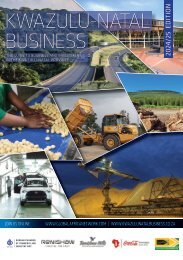Gauteng Business 2016 edition
The 2016 edition of the Gauteng Business and Investment Guide is the premier business and investment guide for the Gauteng province and the Gauteng Growth and Development Agency (GGDA). In addition to detailed profiles of key provincial organisations, including the GGDA, the Automotive Industry Development Corporation Centre (AIDC), the Gauteng Investment Centre, the Gauteng IDZ, the Gauteng ICT Park SEZ and Constitution Hill, this edition includes well-researched economic and demographic data on the province, as well as insights into the province’s five development corridors and the new industries and development nodes in these corridors; a focus on Gauteng as a global city region; and key growth sectors for the province.
The 2016 edition of the Gauteng Business and Investment Guide is the premier business and investment guide for the Gauteng province and the Gauteng Growth and Development Agency (GGDA). In addition to detailed profiles of key provincial organisations, including the GGDA, the Automotive Industry Development Corporation Centre (AIDC), the Gauteng Investment Centre, the Gauteng IDZ, the Gauteng ICT Park SEZ and Constitution Hill, this edition includes well-researched economic and demographic data on the province, as well as insights into the province’s five development corridors and the new industries and development nodes in these corridors; a focus on Gauteng as a global city region; and key growth sectors for the province.
Create successful ePaper yourself
Turn your PDF publications into a flip-book with our unique Google optimized e-Paper software.
OVERVIEW<br />
Finally, a variety of the beverages<br />
in AVI’s portfolio (including Ciro)<br />
are produced at the group’s<br />
Kempton Park facilities.<br />
By the numbers<br />
About 84% of South African<br />
households engaged in agriculture<br />
are headed by people with<br />
incomes of less than R38,400 a<br />
year according to a Statistics<br />
South Africa survey. However,<br />
almost 2 800 of those in the<br />
high-earning category are from<br />
<strong>Gauteng</strong>. It is the highest number<br />
in this segment among the<br />
provinces, even though <strong>Gauteng</strong><br />
(279 000 agricultural households)<br />
ranks only a distant fourth behind<br />
KwaZulu-Natal (717 000),<br />
the Eastern Cape (597 000) and<br />
Limpopo (468 000).<br />
Women make up 48% of agricultural<br />
household heads in<br />
South Africa. In the Eastern Cape<br />
(55%), KwaZulu-Natal (54%) and<br />
Limpopo (52%) they outnumber<br />
men. Regarding rural access to<br />
water, the survey found that 20%<br />
of the households nationally had<br />
no access to piped water, and a<br />
further 28% had piped water<br />
only outside their yards. In this<br />
respect again <strong>Gauteng</strong> and the<br />
Free State seem best served.<br />
Most of the rural households use<br />
electricity for lighting and cooking,<br />
though wood is also used<br />
to a great extent for cooking in<br />
KwaZulu-Natal, Limpopo and the<br />
Eastern Cape.<br />
Meanwhile, Economic<br />
Development, Agriculture and<br />
Rural Development MEC for<br />
<strong>Gauteng</strong> Lebogang Maile said<br />
access to land was key to transforming agriculture in the province,<br />
“The decline in mining activity and the attendant consequences of<br />
deindustrialisation, the agricultural industry presents real possibilities<br />
for a shift in the orientation of these regions. More importantly, as an<br />
industry that can propel growth in other sectors placing <strong>Gauteng</strong> on<br />
different economic trajectory.<br />
“We must emerge out of this summit with a strategy that merges<br />
our agenda to promote food security, integrate black farmers, lessened<br />
our dependence on food imports, and empower poor communities<br />
to take charge of their nutritional needs by supporting<br />
community and household food gardens on a massive scale. We<br />
must emerge with a resounding commitment to use agriculture as<br />
a launching pad toward the realization of the transformation, modernization<br />
and reindustrialisation programme. I believe that agro<br />
processing, along with a clear strategy for economic diversification,<br />
can give the economies of the West Rand and Sedibeng a new lease<br />
on life,” concludes Maile.<br />
83 GAUTENG BUSINESS <strong>2016</strong>


















